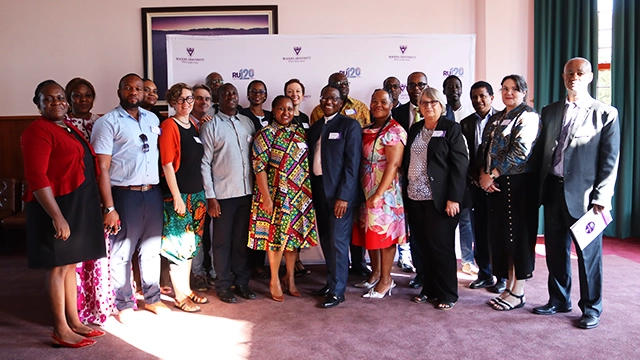[RU120] Celebrating 120 years with two new research collaborations at Rhodes University

By Lance Myburgh
Rhodes University’s RU120 celebrations furthered its impact through the launch of two new ARUA/The Guild Africa-Europe Clusters of Research Excellence (CoREs), which took place on 08 March 2024.
This event, a hybrid gathering, brought together stakeholders from the African Research Universities Alliance (ARUA), The Guild of European Research-Intensive Universities (The Guild), and additional universities participating in the newly-introduced CoREs. These include the Water Resources Management CoRE, under the co-leadership of Dr Jane Tanner, and the Creative Economies CoRE, co-led by Professor Jen Snowball at Rhodes University.
The launch marked a pivotal moment in the University’s commitment to advancing research education, celebrating decades of complex networks and academic research depth for the RU120 anniversary. The event facilitated crucial discussions around rebalancing research leadership and activities between Africa and Europe, urging collaborative efforts towards addressing water sustainability challenges and fostering creative economy development. The primary goal was to knit closer ties between universities in both hemispheres, fostering mutually beneficial and equitable research relationships for a sustainable future.
Rhodes University Vice-Chancellor, Professor Sizwe Mabizela, opened the event with a warm welcome extended to esteemed dignitaries, distinguished guests, local and international stakeholders, and all in-person and online attendees. In his opening address, he accentuated the dual nature of the challenges confronting humanity, emphasising their local and global dimensions. Professor Mabizela underscored Rhodes University's vision, and commitment to pioneering the creation and advancement of knowledge that is both locally responsive and globally engaged. Central to this vision is the University's dedication to fostering a just and equitable society, epitomising its role as a leader in higher education.
CoRE - Water Resource Management for a sustainable and just future
In an innovative effort, Professor Barbara Hribar (Physical Chemistry at the University of Ljubljana), Prof Nelson Odume (Institute for Water Research Director, Rhodes University) and Dr Tanner (Director of the ARUA Water Centre of Excellence) explored key advancements in understanding and managing water resources sustainably and justly. Dr Tanner presented strategies for reimagining water resources, focusing on sustainable management, resource recovery, and improved efficiency. She advocated for interdisciplinary PhD training and highlighted the commitment to European-African researcher collaboration. The launch of a Doctoral school programme, set for January 2026, aims to provide bursaries for 700 PhDs in the water sector, which includes exciting CoRE work in hydrological modelling and machine learning, addressing global water challenges.
“This new cluster represents the next step in showcasing the knowledge that Africa has,” said Dr Tanner.
CoRE - Creative Economies: cultures, innovation and sustainability
The launch of the second CoRE was led by Professor Snowball, alongside Professor Duro Oni (University of Lagos), Professor Roberta Comunian, and Dr Eka Ikpe (King’s College London). They emphasised the importance of sustainable development through engagement with diverse cultures and community dialogues. This CoRE aims to be a global reference point for creative economy research, focusing on empowering higher education, bridging networks across continents, aligning with UNESCO’s SDGs, and fostering interdisciplinary collaboration. The Creative Economies CoRE highlights both long-term impacts and short-term objectives, such as the “Re Cr E A” online seminar series and the monthly newsletter on African creative economies. The African Journal of Creative Economy (AJCE) was launched, an open-access journal published by AOSIS and affiliated to the CoRE was also launched. The AJCE is an interdisciplinary journal covering a wide range of areas, such as cultural policy, creative labour markets and cultural trade, that aims to offer a platform for research grounded in the African context.
Representatives from the National Research Fund (NRF) in attendance emphasised that the foundation of the CoRE system fosters global collaboration, which better links to funding initiatives.
In closing, Rhodes University Deputy Vice-Chancellor of Research, Innovation and Partnerships, Dr Kwezi Mzilikazi, stated, “Rhodes University takes great pride in hosting events that foreground collaboration and excellence in research.”
Both Rhodes University representatives of the clusters, Dr Tanner and Prof Snowball, expressed their hope and aspiration for the legacy of this project in decentralising leadership to permit all involved to utilise the platform.
“Despite their reputation for being elite, I want to emphasise that the Clusters of Research Excellence are inclusive entities,” said Professor Ernest Aryeetey from ARUA. “The ones launched today include universities outside the ARUA and The Guild network, emphasising our commitment to inclusivity and collaborative research for a sustainable future.”
This launch served as a primary reminder of the power of collaboration between Europe and Africa, promoting indigenous research knowledge to develop modern outcomes. It is believed that the legacy of this initiative will continue to inspire others to join, promote, and contribute to the birth of a collective of ideas that could provide opportunities for academics to cultivate differences on a global scale in their research.
Previous Article Next Article
